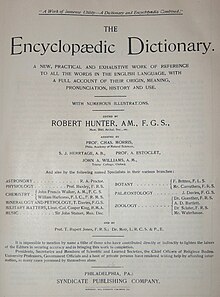
Back Enciklopedia vortaro EO לקסיקון HE Enciklopedijski rječnik Croatian Dizionario enciclopedico Italian Dicionário enciclopédico Portuguese Enciklopedijski rječnik SH Fjalori enciklopedik SQ Энциклопедик сүзлек TT Pek-kho-sek sû-tián ZH-MIN-NAN
This article includes a list of general references, but it lacks sufficient corresponding inline citations. (June 2019) |

An encyclopedic dictionary typically includes many short listings, arranged alphabetically, and discussing a wide range of topics.[1] Encyclopedic dictionaries can be general, containing articles on topics in many different fields; or they can specialize in a particular field, such as art, biography, law, medicine, or philosophy. They may also be organized around a particular academic, cultural, ethnic, or national perspective.[citation needed]
Historically, the term has been used to refer to any encyclopedic reference book (that is, one comprehensive in scope),[citation needed] which was organized alphabetically, as with the familiar dictionary (the term dictionary preceded encyclopedia in common usage by about two centuries). To convey their alphabetic method of organization and to contrast that method with other systems for classifying knowledge, many early encyclopedias were titled or sub-titled "a dictionary of arts and sciences" or something similar.[citation needed]
However, it later developed into a somewhat distinct class of reference books. While there are similarities to both dictionaries and encyclopedias, there are important distinctions as well:[citation needed]
- A dictionary is primarily focused on words and their definitions, and typically provides limited information, analysis of different forms, and an etymology (in more complete dictionaries) for the word defined. Hence, while it may offer a definition, it may leave the reader still lacking in understanding the meaning or import of a term, and how the term relates to a broader field of knowledge.
- An encyclopedia, on the other hand, seeks to discuss each subject in more depth and convey the accumulated knowledge on that subject. This characteristic is especially true of those encyclopedias with long monographs on particular subjects, such as the first ten editions of the Encyclopædia Britannica. While often organized alphabetically, some encyclopedias were not. Usually, more of the discussion may be organized around a field (such as law) or a topic (such as the Scottish enlightenment), and less on the alphabetic terminology related to that discussion. An encyclopedia also often includes many maps and illustrations, as well as bibliography and statistics.
Compared to a dictionary, the encyclopedic dictionary offers a more complete description and a choice of entries selected to convey a range of knowledge. Compared to an encyclopedia, the encyclopedic dictionary offers ease of use, through summarized entries and in some cases more entries of separate terms; and often reduced size, and the reduced publishing and purchase cost that implies.
The question of how to structure the entries, and how much information to include, are among the core issues in organizing reference books. As different approaches are better suited to different uses or users, all three approaches have been in wide use since the end of the 18th century.[citation needed]
The title of the volume may not be a good indication of which type of reference it is, as commercial concerns may have affected the publisher's selection of a title.[citation needed]